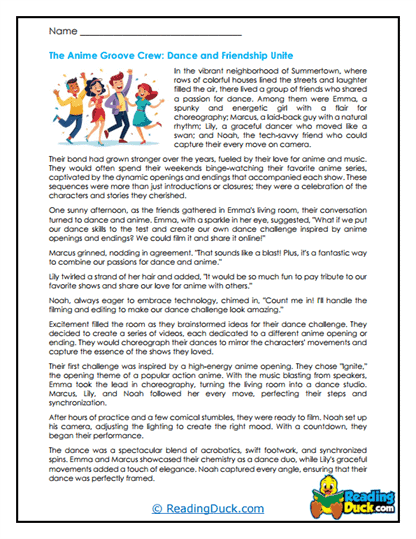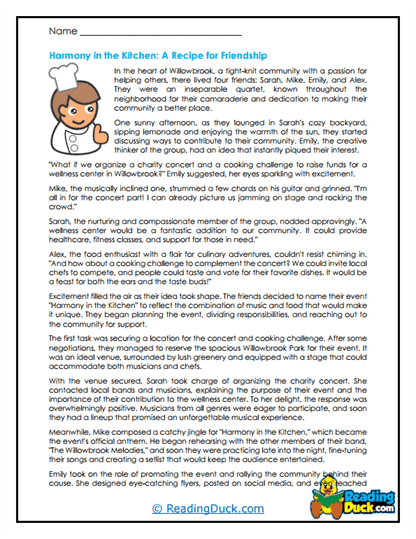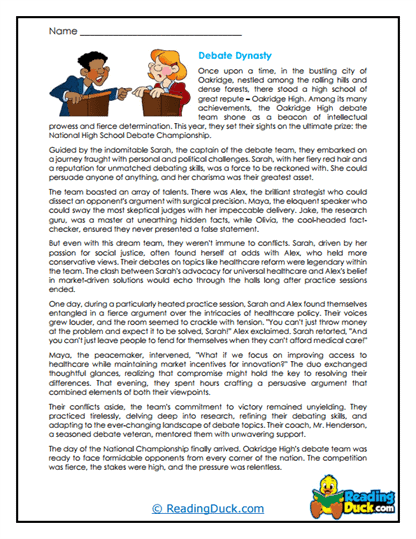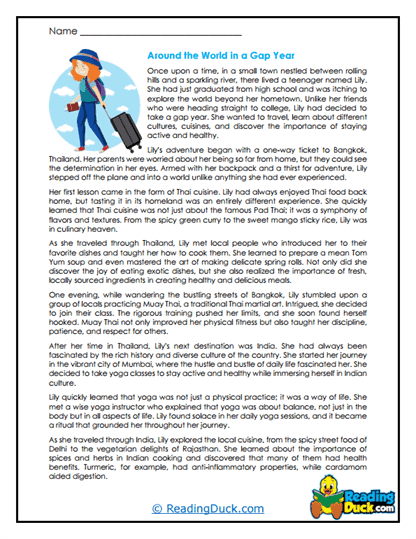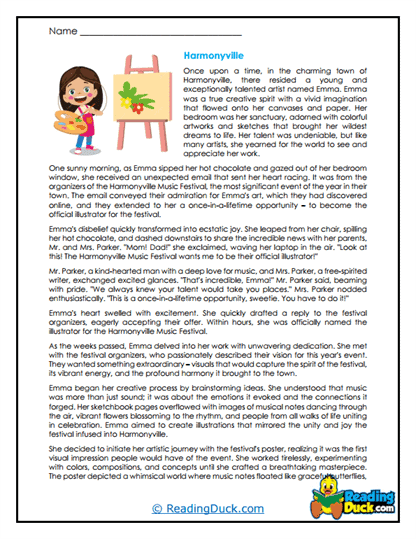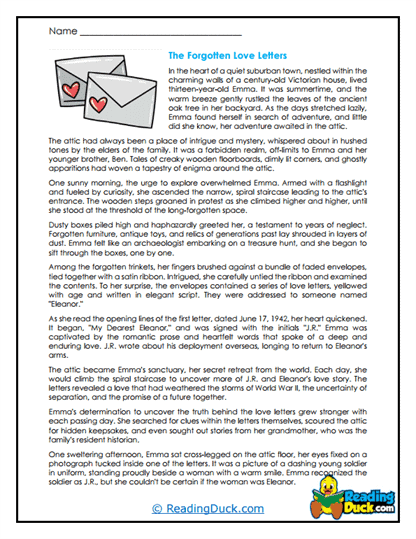1,500 Words Worksheets
About Our 1,500 Word Reading Worksheets
Our 1,500 Words Worksheets are an essential resource designed to challenge and enhance students’ reading comprehension skills. Each worksheet features a reading passage that is exactly 1,500 words long, ensuring a consistent and structured approach to improving literacy. The passages are accompanied by vibrant, relevant images that engage students and provide visual context for the material. This combination of text and imagery makes the reading experience more interactive and helps students connect with the content.
Each worksheet includes a variety of questions designed to assess different levels of comprehension:
- Multiple-choice questions: These questions test students’ understanding of key facts and details from the passage.
- Short answer questions: Students are required to explain specific points in their own words, encouraging them to engage more deeply with the text.
- Open-ended response questions: These prompts allow students to think critically, reflect on the passage’s themes, and provide their own interpretations.
Additionally, every worksheet comes with a downloadable answer key to simplify grading and provide immediate feedback. All worksheets are presented in PDF format, making them easy to download, print, and incorporate into lesson plans for both classroom and remote learning.
Integrating 1,500 Words Worksheets Into Lesson Plans
Our 1,500 Words Worksheets are designed to be flexible, allowing educators to integrate them into various instructional strategies. The consistent word count across all worksheets makes them an effective tool for gradually increasing reading difficulty and helping students develop the stamina needed for longer, more complex texts. Educators can use these worksheets as part of a broader approach to scaffolding reading comprehension.
Here are several ways to incorporate these worksheets into lesson plans:
- Guided reading sessions: In small groups, teachers can guide students through the passage, pausing to discuss difficult vocabulary or complex ideas. This approach allows students to receive real-time support as they work through the text.
- Group activities: Assigning these worksheets to groups encourages collaborative learning. Students can discuss the passage and answer the questions together, which promotes peer-to-peer engagement and a deeper understanding of the content.
- Independent assignments: These worksheets are perfect for independent practice. Students can work through the passage and questions at their own pace, helping them build both comprehension skills and reading stamina.
Because the worksheets are structured around a consistent word count, educators can easily align them with curriculum goals. Whether used for reinforcing reading strategies, analyzing literary elements, or developing critical thinking skills, these worksheets can support a wide range of instructional objectives.
Adapting to Different Reading Levels
The 1,500-word count of these worksheets makes them adaptable to students with varying reading abilities. While the length remains consistent, the complexity of the passages can be adjusted to match different grade levels or student needs. This flexibility ensures that each student is challenged appropriately, without feeling overwhelmed by the content.
These worksheets are beneficial for:
- Upper elementary students: As students transition to more advanced reading material, the 1,500-word passages help them build the stamina required for middle school texts.
- Middle school students: These worksheets challenge students to engage with more sophisticated texts, enhancing their ability to analyze, summarize, and interpret longer works.
- High school students: For high school students, the longer passages help develop the critical thinking and analytical skills necessary for tackling complex academic texts.
The consistent word count also allows educators to track progress more effectively. By observing how students perform on passages of the same length but varying difficulty, teachers can measure growth in reading fluency and comprehension. This structured progression helps ensure that students are making steady, measurable improvements in their reading skills.
Enhancing Vocabulary Development
One of the key advantages of our 1,500 Words Worksheets is their ability to support meaningful vocabulary development. As students engage with longer passages, they are exposed to a broader range of vocabulary in context, which helps them understand new words more effectively than through isolated word lists. This contextual learning approach enhances both comprehension and retention of new vocabulary.
Teachers can maximize vocabulary building through these worksheets by:
- Pre-teaching key vocabulary: Before reading, educators can introduce challenging words from the passage, helping students familiarize themselves with important terms.
- Using context clues: As students encounter unfamiliar words, they can be encouraged to use surrounding text to infer meaning. This practice helps students develop the critical skill of deciphering words based on context.
- Reinforcing vocabulary: After completing the passage, teachers can assign writing tasks or discussions where students use the new vocabulary in their responses, reinforcing retention and practical application of the words.
The extended length of the passages also provides opportunities for students to encounter a more diverse range of vocabulary and language structures. This exposure to more complex language naturally builds students’ literacy skills, helping them become more confident readers and writers over time.
Supporting Curriculum Standards
Our 1,500 Words Worksheets are aligned with educational standards, including Common Core State Standards and various state-specific literacy benchmarks. This alignment ensures that these worksheets are not only effective tools for reading comprehension but also support the broader literacy objectives required by most educational systems.
Key literacy skills developed through these worksheets include:
- Fluency: The consistent 1,500-word count provides practice in reading longer passages fluently, improving both speed and accuracy.
- Comprehension: The variety of questions included with each worksheet ensures that students engage with the text on multiple levels, from identifying main ideas and details to making inferences and analyzing themes.
- Vocabulary acquisition: The exposure to more complex language helps students build the vocabulary necessary to meet grade-level expectations in both reading and writing.
By using these worksheets, educators can feel confident that they are helping students meet important literacy benchmarks. Whether used as part of a comprehensive reading curriculum or as supplemental material, the worksheets provide a structured and effective way to reinforce key reading skills.
Encouraging Critical Thinking and Analysis
Our 1,500 Words Worksheets go beyond basic comprehension by promoting critical thinking and deeper analysis. The open-ended questions included in each worksheet encourage students to reflect on the passage, analyze the themes, and make connections to their own experiences or to broader concepts.
To enhance critical thinking, teachers can:
- Lead classroom discussions: After students complete the worksheet, teachers can facilitate discussions about the key ideas, themes, or messages in the passage. This not only helps students articulate their thoughts but also encourages them to listen to and consider different viewpoints.
- Assign reflective writing tasks: Teachers can ask students to expand on their open-ended responses by writing essays or personal reflections that explore the passage in greater depth.
- Draw cross-curricular connections: Teachers can select passages that relate to other subjects, such as history, science, or social studies, helping students see the relevance of their reading across different areas of learning.
These activities help students develop higher-order thinking skills, such as analysis, evaluation, and synthesis, which are crucial for academic success. Encouraging students to engage critically with the text prepares them for more advanced reading and writing tasks in the future.
Monitoring Student Progress
The fixed word count of 1,500 words provides a consistent framework for tracking student progress. By assigning these worksheets regularly, educators can observe how students’ reading comprehension, fluency, and vocabulary skills evolve over time. This ongoing assessment allows teachers to identify areas where individual students may need additional support or instruction.
Educators can use these worksheets to:
- Track reading fluency: By comparing students’ performance on passages of the same length, teachers can assess improvements in reading speed and accuracy.
- Monitor comprehension skills: The variety of questions included in each worksheet offers insight into how well students are understanding the material, allowing teachers to pinpoint areas for improvement.
- Provide constructive feedback: The downloadable answer key makes it easy for educators to assess student responses and offer timely, meaningful feedback that helps students continue to grow.
Regular use of these worksheets ensures that students are continually building their reading skills and making measurable progress towards academic goals.
Conclusion
Our 1,500 Words Worksheets are a versatile and effective resource for developing students' reading comprehension, vocabulary, and critical thinking skills. By providing structured reading passages of consistent length, along with varied comprehension questions, these worksheets help students build the stamina and focus required to engage with longer, more complex texts.
With their adaptability across grade levels and their alignment with educational standards, these worksheets are valuable tools for educators seeking to enhance student literacy. Whether used in guided reading sessions, group activities, or as independent practice, the 1,500 Words Worksheets provide a reliable and structured way to support student progress in reading and comprehension.
By promoting vocabulary development, encouraging critical analysis, and offering a framework for tracking student progress, these worksheets help educators ensure long-term reading growth and academic success.
